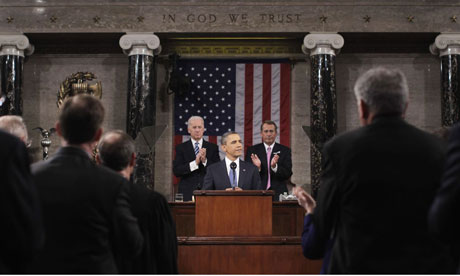
President Barack Obama’s State of the Union speech was firm but conciliatory. The principle reason for that is the new political majority in the House of Representatives. He also proposed a five-year freeze on domestic spending to reduce the size of the federal debt. Whether this will avoid a showdown between Democrats and Republicans is questionable.
The decisive quote came right at the start: “We will move forward together, or not at all,” Obama said. That was the central message of his address, the same appeal for cooperation he made after the Tucson shootings. But it is also necessary because the new majority in the House demands exactly that: cooperation. And if the latest opinion polls are any indication, that is exactly what the American people want as well.
But whether that cooperation will actually take place in the 21 months between now and the next presidential election is still an open question. Although Democrats and Republicans symbolically sat together during the speech — a novelty for such events — the Republican rebuttal to the address made clear just how deep the chasm between the parties remains and even shows up a split among Republicans themselves. This time, there were two very differing opposition responses to the speech: One was the official rebuttal given by budget specialist Paul Ryan, and the other was delivered by tea party activist Michele Bachmann. Where Ryan’s response was conservative but balanced, Bachman oversimplified America’s problems wherever possible.
Obama was careful not to supply too much in the way of ammunition for the opposition. The president, whose popularity has been on the upswing again lately, tried to enumerate the problems the nation faced but also to generate an atmosphere of breakthrough and optimism. As if he had borrowed Bill Clinton’s theme, “I feel your pain,” he gave emotionally vivid examples of how the financial crisis still affects Americans. He said that he was willing to make spending cuts, but added: “But let’s make sure that we’re not doing it on the backs of our most vulnerable citizens.”
He made clear at several different points where he drew the line on economizing. In education, he said it was necessary to improve the nation’s schools lest America fall further behind other nations. He also addressed America’s infrastructure, which had previously been very good but meanwhile had suffered the results of neglect.
He also addressed the issue of climate change despite the fact that his EPA director, Carol Browner, had resigned just hours prior to his address. She had thrown in the towel in frustration over the stalemate in environmental policy. But Obama went on undaunted, announcing that by the year 2035, the United States would be producing 80 percent of its electricity from clean energy sources. If the effort proved successful, it would be America’s “Sputnik moment” he said, in reference to the Soviet Union’s 1957 launch of the first earth-orbiting satellite that touched off a quantum leap in scientific achievement.
The confrontation over how best to economize might play out along such lines. The radical economy measures proposed mainly by the tea party advocates would endanger America’s future, a view held not only by the president. But the Republicans won election last November precisely because of public displeasure over record deficits. If these Republicans follow the will of the voters who elected them, a political head-on collision is inevitable.

Leave a Reply
You must be logged in to post a comment.